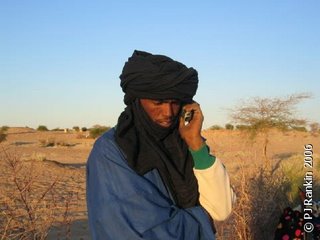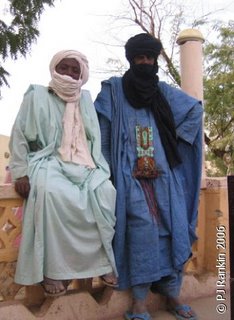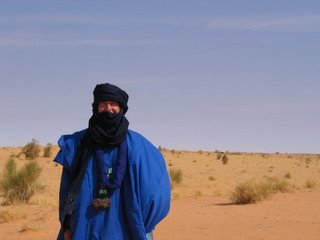Encore en famille en Tombouctou
Although it's exactly four years since my last time researching there, walking the dusty streets of 'Tombouctou La Mystérieuse' again it is so very familiar. The sandy roads, the maze of mud buildings, the figures drifting around in long robes - and feeling more comfortable and properly dressed wearing my own cotton Tuareg 'blues', with the burn hole from a Niger campfire completed this time with a matching blue arm cast, a December blessing from the Christo for daring to top His statue in Rio.
Tuareg men think that the indigo cloth's blue staining of a women's skin is very attractive. In the West we've lost our appreciation for precious cloths, say like the silks you find in India. For the Tuareg, the most precious is the indigo material, 'tagelmoust' which costs a fortune per metre and is worn at weddings or special occasions like below, or given as important gifts to a chief. The indigo dye is rubbed by hand into the tagelmoust until it has a metallic black-purple sheen. The slightest touch with a finger comes away blue.

It will probably take two weeks again of blue showers to get the dye out of my hair from my indigo 'shesh' (turban) I guess. Traditional Tuareg men cover their mouth at all times with strangers, often instinctively punctuating conversations by adjusting the amount of nose and mouth they reveal - a sort of body language signing the state of play of the relationship. After spending time with them, I've now also started to feel embarrassed to be caught 'with my shesh down' when meeting a stranger - you are judged by your shesh and how it is wrapped and draped. So, it's quite a worrying test, my having to bind the 5metres of my indigo shesh round my head for the first time for 4 years in front of Tuareg friends ! Luckily, my hands remember the folds and twists by themselves and so the verdict was 8 out of 10! Some signs of improvements in the town can be seen since four years ago, thanks to the German and Canadian development aid money. It's eventually got through to doing some real good on the ground- like the paving stones being laid around the ancient Djingarey Ber mud-walled mosque, the water reservoir and the big new grande marché building, built to replace the one that fell down.
Some signs of improvements in the town can be seen since four years ago, thanks to the German and Canadian development aid money. It's eventually got through to doing some real good on the ground- like the paving stones being laid around the ancient Djingarey Ber mud-walled mosque, the water reservoir and the big new grande marché building, built to replace the one that fell down.

Signs of changing times too, like the teenagers around the big Timbuktu college high school with dreadlocks or wearing the latest Bamako jeans. The biggest change: mobile phones everywhere that threaten the old telecentre phone cabins where making a phone call was a long wait, an opportunity to chat with the others patiently waiting for the 'lottery'- a successful connection across the antiquated Malian network- and listen in on interesting conversations on the shared phone!
 How ironic and sad that the cell phone which promises freedom mobility should be the reason why many nomads are now moving closer to Timbuktu to settle there within the range of the town's cellular coverage!
How ironic and sad that the cell phone which promises freedom mobility should be the reason why many nomads are now moving closer to Timbuktu to settle there within the range of the town's cellular coverage!
Anyway at least some of the mystery is still being preserved:
I checked out that one plaque is still there from the last time - just like worthy H. Barth's and R. Caille's plaques above the big Moroccan-studded doors... delusions of grandeur and posterity! 
An old man wanted a reward for taking a stick to some bad kids who had been throwing stones at it. Disgraceful! Nice to see that the Timbuktu heritage is being protected there anyway and hear that some tourists have been taken to see the 'other special plaque' in Timbuktu - for an extra CFA commission to my Tuareg guide friends, of course!
 On the veranda where everyone meets at the back of the old hotel Bouctou, looking out on the desert watching kids playing evening football on the sand and donkeys laden with fodder, nothing seemed to have changed.
On the veranda where everyone meets at the back of the old hotel Bouctou, looking out on the desert watching kids playing evening football on the sand and donkeys laden with fodder, nothing seemed to have changed.
 It touched my heart to be greeted so warmly by many, many Tombouctien friends: Maiga the barber of Timbuktu; Suleman; 'Sandy' the Tuareg chief with a sense of humour as dry as the desert; Ms. Toure, Baaba, Ismail and all the staff of the Bouctou; little Boudjema from the remote village of Araouane disappearing in the sand halfway on the caravan route from the salt mines on the Algerian border; 'le pilot du desert' big Boudjema who featured in an interview with Bob Geldof last year and many more - even the ever-friendly cripple Bunji, almost falling over on his crutches rushing across the sand to say hello again - and last but not least my adopted Tuareg 'brother', dear Azima.
It touched my heart to be greeted so warmly by many, many Tombouctien friends: Maiga the barber of Timbuktu; Suleman; 'Sandy' the Tuareg chief with a sense of humour as dry as the desert; Ms. Toure, Baaba, Ismail and all the staff of the Bouctou; little Boudjema from the remote village of Araouane disappearing in the sand halfway on the caravan route from the salt mines on the Algerian border; 'le pilot du desert' big Boudjema who featured in an interview with Bob Geldof last year and many more - even the ever-friendly cripple Bunji, almost falling over on his crutches rushing across the sand to say hello again - and last but not least my adopted Tuareg 'brother', dear Azima. Time to catch up on each others' families and news before separating the luggage to set off West into the desert the following morning.
Time to catch up on each others' families and news before separating the luggage to set off West into the desert the following morning.
 Back - en famille
Back - en famille




0 Comments:
Post a Comment
<< Home